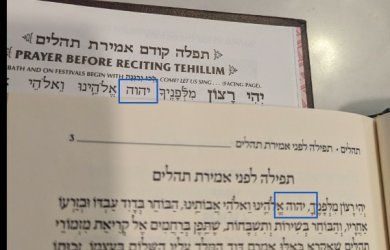Agreed. FYI: The name YHVH is included in many of the traditional Hebrew texts. I just checked two books of Psalms from two different orthodox publishers.
View attachment 87689
YHVH Tzvaoht, yes is one of God's names. Yes, that is one that I had referred to.
Perhaps **I** misunderstood.
I interpretted your question: "Wasn't
each of God's other names starting with YHVH/YHWH?" I thought you were asking about ALL of God's names ( "
each of those other names" ) in Hebrew. Do they ALL begin with YHVH? I answered 'No'. Some of them do.
The only one which is, technically, not pronounceable in absolute truth is YHVH.
Because as a finite being, I can utter the other names properly in absolute truth. "My Lord" is something which can easily and rapidly produce a conception and comprehension in both mind and heart of the Lord God the Most High ( "אײבערשטער" in yiddish ) in absolute truth. Of course, it
can be spoiled, or polluted, for lack of better words, by applying human-fleshy forms to this conception and comprehension. One method, among others, to prevent this, is, to retain a certain awe and reverence for the names of God. Retaining this awe ( healthy fear ) is a practice. Day to day, hour to hour, minute to minute, moment to moment. It's a way of life. Hence the useage of 'HaShem' in everday conversation or 'Aybeshter' in yiddish.
If it is practiced and included as part of the way of life of
being Jewish, then in prayer it happens almost automatically. The prayer service is written and designed intentionally to facilitate this awe and reverance while simultaneously laying a foundation for an encounter with the one and only God of Abraham, Isaac, and Jacob.
God is infinitely mysterious. The name YHVH is a mystery reflecting this ( to a small degree, in comparrison ). When the name is included in prayer, it is an opportunity to produce a
unique conception and comprehension which is absolutely true as long as the name remains ... unspoken. Pronouncing the name is making it less mysterious which undermines, and potentially sabatoges, the comprehension and conception which is needed for the psyche ( heart-and-mind ) to encounter God at the extreme, most profound levels, of human capability.
King David writes:
139:6
פלאיה דעת ממני נשגבה לא־אוכל לה׃
Such knowledge is too wonderful for me; it is high, I cannot attain it.
Moses writes:
91:1
ישב בסתר עליון בצל שדי יתלונן׃
He who dwells in the secret place of the most High, who abides under the shadow of the Almighty,
91:2
אמר ליהוה מחסי ומצודתי אלהי אבטח־בו׃
Will say to the Lord: "My refuge and my fortress, my God, in whom I trust".
The Sons of Korach sing in the temple:
84:13
יהוה צבאות אשרי אדם בטח בך׃
Lord of hosts, happy is the man who trusts in you.
Sure. God's name in that context is not the pronounciation. Pronouncing it correctly is important, but, there's more that's needed for those who are described as "priests". This is clear to me, in context and specifically from verse 6. Also, verse 10, imo, is significant for this discussion because of the spiritual directive embedded in the verse. When I read it, closing the "doors" has a double meaning and "kindling fire on God's altar" is both material and spiritual.
The book of remembrance records God's actions and miracles and promises which are fullfilled. These are the reasons why God's name is revered beyond the borders...
The chapter ends:
וארור נוכל ויש בעדרו זכר ונדר וזבח משחת לאדני כי מלך גדול אני אמר יהוה צבאות ושמי נורא בגוים׃
Let the deceiver be cursed, who has in his flock a male, and yet vows, and sacrifices to the Lord what is blemished; for I am a great king, says the Lord of hosts, and my name feared among the nations.
When something is fearsome it is not engaged casually. We can go through the whole chapter verse by verse if you'd like.

